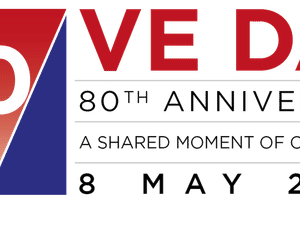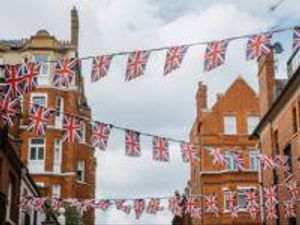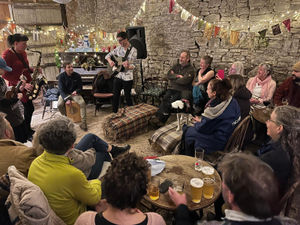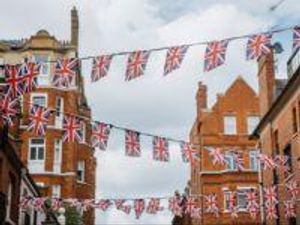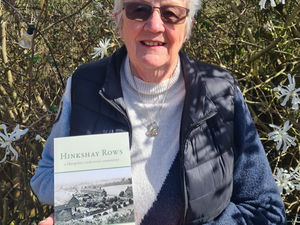Party like it's 1945: Memories of VE Day in Shropshire from the people who were there
On May 8, 1945 the British public took to the streets and packed Trafalgar Square to celebrate Victory in Europe Day.
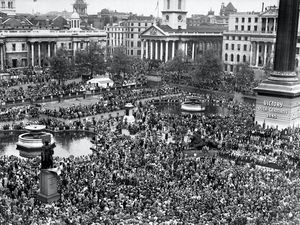
As the capital was swamped with people, so communities across the Midlands found their own way to celebrate.
From big cities to small rural villages, it was a moment in time that would create a life-long memory.
Full coverage:
Songs and celebrations rang out as the country marked the end of six long, hard years of war across our continent.
For many VE Day was also a time to reflect on the loss of loved ones and the sacrifice of a whole generation of young men.
Diaries and memoirs from the time show many people felt relief rather than exhilaration.
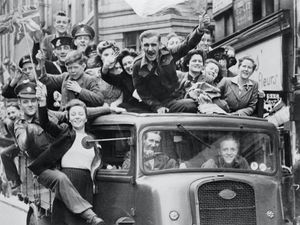
The public was also conscious that the war in the far east was still ongoing and that soldiers in the Middle East and Italy were being redeployed to the Pacific to fight the Japanese.
While this year the coronavirus lockdown has meant that hundreds of celebrations planned for the 75th anniversary have had to be cancelled, many have adapted and are going ahead with events that celebrate the day but also remember those that never came home.
In the same way that millions of Britons have used technology to satisfy their pub quiz itches, see family members, and even get married, VE Day 2020 on May 8 is taking place at home and online.
And for those who lived through VE Day, today marks a special anniversary. Their stories are remarkable. They chronicle a time when Britain had faced its biggest test and was looking to better days ahead.
See the memories from people across Shropshire below.
'You used to get stricken with fear whenever you heard a plane fly overhead'
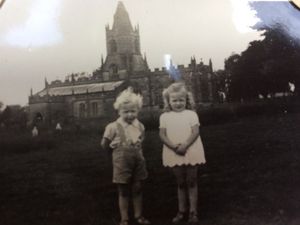
It was March 11, 1941, and a farmer and a policeman trudged out into the fields near the village of Tong where two bombs had been seen dropping from the sky.
The bombs had fallen on land at Tong Hill Farm where the Morris family had been tenants of Bradford Estates since 1932.
“I remember the bombs falling,” said Elizabeth Mason, who was just four-years-old at the time.
“My father Tom Morris headed out with the local policeman to go and look to see where they had fallen.
“Another 24 hours later and the bombs had exploded, and as I recall it did a bit of damage to the roof and wall of the house. A crater still sits on the farm to this day.”
As a child Elizabeth remembers growing up on the farm with her brother Tom and attending the Tong village school, which she started at during war time.
“I remember you used to get stricken with fear whenever you heard a plane fly overhead,” she said.
“You always wondered if it was the Germans coming for us. We didn’t have a shelter or anything, but I seem to remember getting under the kitchen table. After planes had passed over you would sometimes go out and find a silvery coloured paper that the planes had dropped on the fields. I’m not sure what it was, but I used to go and pick it up.”
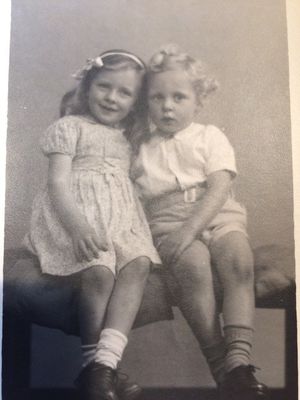
It is likely this silver paper was dropped in order to counteract German detection and radar equipment.
“Children in the country were much luckier than those in the town. We had access to things like rabbit to eat. We were a little more self sufficient,” said Elizabeth.
“I have seen a diary entry from my father in 1941 which said he had dug up the lawn in order to grow more vegetables for the family. That’s what it was like for us in the country during the war.”
In 1945 the bombs stopped, the war was over and on May 8 VE Day celebrations took place all around the country, and this year marks the 75th anniversary of the momentous occasion.
“I do remember VE Day as a child,” said Elizabeth. “We had a great party at the parish hall in Tong. I suspect that was just the children’s party and that the adults continued well into the night after we had been put to bed.
“I just remember that day being rather fun from a child’s perspective.”
Elizabeth and the Morris family have a strong heritage in the Tong area. Elizabeth’s grandfather Thomas Morris and his wife Elizabeth took the tenancy of Church Farm in Tong in 1913, and from there the Morris family had a real connection to the area owned by Bradford Estates.
Elizabeth’s brother Tom still lives in Tong Hill Farmhouse to this day, although she has since moved to live in Newport where she lived with her husband John until his death two years ago.
'The sounds of his screams emitting from behind the door never go away'
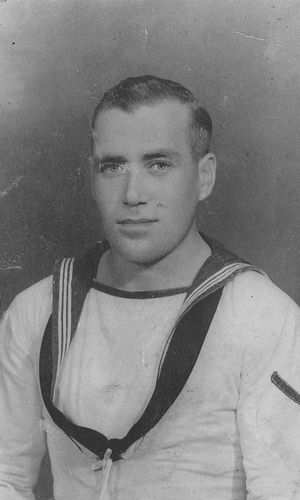
The European war may have been over, but it left some servicemen fighting a battle for the rest of their lives.
One of those was Tom Bourne, of Lawley Bank, who was born on August 21, 1917, and who joined the Royal Navy in 1940 and trained in wireless telegraphy and the operation of landing craft.
Able Seaman Bourne's skills saw him in active service across many theatres of war, including North Africa, Italy, Burma, and the landing craft operation supporting British troops in the liberation of Belsen.
Daughter Carol Williams said: "Dad died on March 2, 1973, aged 56, still fighting his World War Two demons."
The children were told about the euphoria of VE Day.
"We listened as my mother Vera Bourne reminisced about how strangers banged on doors calling for everyone to join in. She climbed out of the bedroom window because her mother was afraid to open the door.
"A conga line of laughing, cheering people twirled and twisted from Beveley, Oakengates, through Ketley to the Cock Hotel and back. Mother's eyes sparkled with tears of joyous memory as she told of the night Britain danced."
However, away from the joy, there was trauma.
Carol says: "The legacy of dad's wartime experiences impacts on our lives to this day. As children we had little understanding of why dad, ‘talked to himself.’
"We carry haunting memories of mother struggling to cope while dad was locked within a traumatised, broken mind.
"The attitude towards mental illness at that time was broadly ‘to grin and bear it.’ Common treatment for sufferers of war trauma was to subject them to barbaric electric shock procedures without anaesthetic.
Solace
"My little brother and I accompanied dad and mother to appointments, we sat on bare wooden benches waiting. The sounds of his screams emitting from behind the door never go away. Confused and scared, we saw the pain and fear on mother's face. No one told the children what was happening.
"Many years later we learn how our dad had saved his mates from dying in icy seas after their ship was torpedoed. There was no recognition of his bravery as he was immediately dispatched to another vessel which also suffered the same fate.
"We learned how he and two other ratings survived nine months lost in the Burma jungle. After being helped by local inhabitants they were eventually rescued by the RAF.
"Physically strong, dad worked ‘when he could’ at Hulse’s iron foundry in Hinkshay, Dawley.
"It was in the garden that dad found solace. Working with nature, growing fruit and veg and nurturing his prize dahlias brought a sense of calm to his tormented mind.
"Today I tell our grandchildren about their great-granddad Tom, show them photographs and remember his beautiful garden.
"The brave men and women from Lawley Bank and beyond who have sacrificed their hearts and minds for us are all heroes
"In the 1950s my brother and I started Lawley Primary School with the firm belief everyone's’ dad had been to this place called ‘War’; we left our school days behind with a different reality.
"The world is united in negotiating a pathway through these deeply troubling times. We hold faith that science will evolve at speed to save our planet.
"Good mental health is the strongest armoury we have to save ourselves. Asking for help is not the shameful scourge it once was. Reaching out is the first step."
'It's very difficult for younger people to understand the atmosphere. We were delighted that the war was over.'
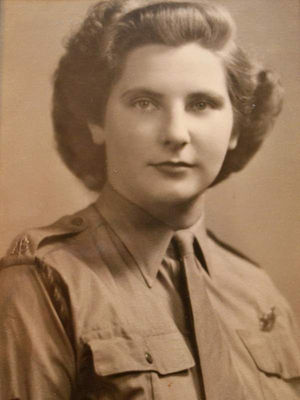
Shropshire-born Mrs Betty Webb, who worked at the top secret Bletchley Park codebreaking centre, joined the crowds as they rejoiced in London.
Betty, who turns 97 on May 13, was at the time the young Betty Vine-Stevens, and serving in the ATS, or Auxiliary Territorial Service – but not in any normal role.
For decades she kept the secret, insisting all she had done in the war was "boring secretarial work." Her parents never learned the truth, as they died before the veil of secrecy was at last lifted in the 1970s.
"I was in Bletchley in the Japanese section when the war in Europe ended, so I still had to carry on," she said.
"On the actual day everyone was absolutely jumping over the moon. I went up to London and joined millions of other people down by the Thames, singing and dancing.
"I went alone, but I met up with a friend who had escaped from Germany and joined up with her to celebrate. She had Jewish connections. We had looked after her from about 1938. Her name was Dorothea Schiffer, and had come to live with us at Richards Castle.
"She was to train in London as a nurse and married here, and I'm still in touch with her daughters and granddaughters."
As the European war came to an end, Betty, who lives at Wythall, not far from Birmingham, said that it was a time of "great relief and much joy."
"It's very difficult for younger people to understand the atmosphere. We were delighted that the war was over."
However, for Betty, who had the rank of Staff Sergeant, the war was certainly not over, as the fight with Japan still had to be won, and she was sent to Washington DC to continue her work with Japanese codes. She was not herself a decoder, but was paraphrasing coded messages.
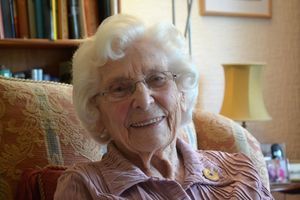
Even when the story of Bletchley Park's crucial wartime role became public, Betty was still unaware of the full picture of what went on there, and was to learn more through reunions with her wartime colleagues.
She had been born in Aston-on-Clun, near Craven Arms, before moving to Richards Castle around the age of four. Her father worked for Lloyds Bank and her mother ran a smallholding. Betty, as she has always been known although her first names are actually Charlotte Elizabeth, was home schooled and then attended Radbrook College in Shrewsbury doing domestic science, but was itching to do her bit for the war effort.
"Four of us decided to forego our domestic science course and join up. I was only 18 – in 1941 I left to join the ATS."
After the war she did return to Shropshire for a while, working as a secretary to the headmaster at Ludlow Grammar School. She married in 1970, but sadly her husband Alfred died young in 1975.
Betty is these days president of the Birmingham branch of the WRAC Association – that's the Women's Royal Army Corps Association, the WRAC being the successor to the ATS.
Looking back, she thinks the reason she had been chosen to go to Bletchley Park was that she had a good grasp of colloquial German. Her mother had been a teacher in Germany in the Great War, going out there on August 3, 1914, the day the war broke out.
In 1937, aged 14 and on a three month-long exchange trip to Herrnhut, near Dresden, Betty was asked to give the compulsory Heil Hitler salute in her classroom and rejected it, flopping her hand down in defiance.
At Bletchley Park she moved to Block F in 1943, and when it was discovered that she was good at paraphrasing, she paraphrased Japanese messages so they were harder to trace by any listeners-in. That way, they were safer to send out to commanders in the field.
She later went on to translate Japanese messages at the Pentagon.
I said: 'What's up?' They said: 'The war's finished.' I said: 'Thank goodness for that.'
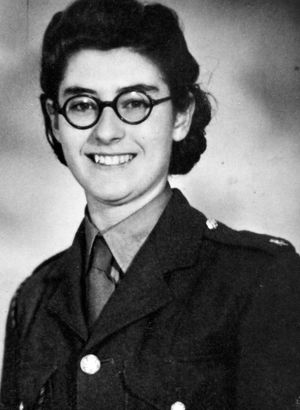
As the nation celebrated, teenage ATS recruit Nancy Scott was at a railway station on her way to her next posting.
"I can't really tell you a lot about VE Day because I was sitting on the railway station with my kit bag waiting for the train," said Nancy, who is now 92-year-old Mrs Nancy Tipton living in Wellington.
"They were all laughing and cheering and happy on the station. I said: 'What's up?' They said: 'The war's finished.' I said: 'Thank goodness for that.'"
Nancy, who hailed from the Lincolnshire village of Metheringham, had volunteered to join the ATS – Auxiliary Territorial Service – in about February 1945.
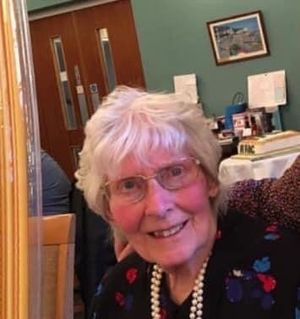
"I volunteered because I wanted to see the world and travel abroad. I have always loved travelling. That didn't happen. On one of my postings I was sent to Lincoln, my home town. Dear me!"
She was serving in the ATS attached to the Royal Army Service Corps, and can still recite her Army number, W/319085.
"I reached the dizzy heights of Lance Corporal before I left."
She was, after a fashion, wounded in action when she opened the door of an oven in which the gas had been left on, and it ignited with a whoosh setting her eyebrows on fire and burning her face and putting her in a military hospital.
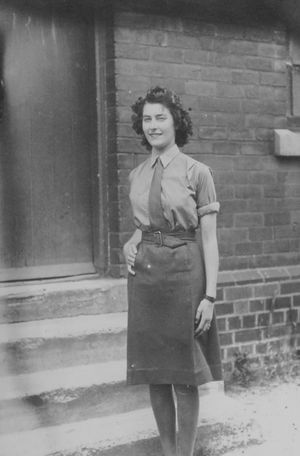
"They painted my face yellow. I had a fortnight's sick leave after that."
It was while serving in the ATS at Catterick that she met her husband-to-be, Roy Tipton from Wellington, who was in the Royal Armoured Corps.
"I left because we got married. In those days you had to come out of the Army if you got married."
Lorry driver Roy had already been demobbed when they wed at Wellington register office on August 2, 1947, and Nancy was demobbed in October.
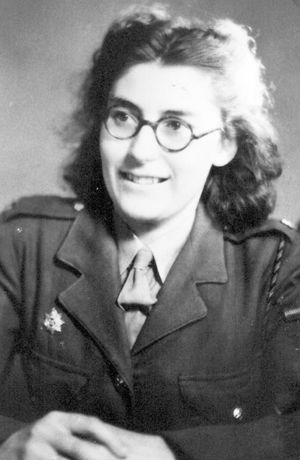
Nancy was christened Annie Irene Scott, but her father would not call her Annie, the name of her mother's mother, because he did not get on with Annie.
"I've been Nancy all my life."
The ATS was superseded in 1949 by the Women's Royal Army Corps. Nancy is a member of the Shropshire branch of the WRAC Association and was chairman for 13 years. She worked at CO Donnington for 24 years, and was the standard bearer for Wellington Royal British Legion for about 11 years.
In March she was invited as a special guest to the unveiling at the National Memorial Arboretum of a new statue honouring the role of the WRAC, but the event was a casualty of the coronavirus outbreak.
A Hitler effigy atop a bonfire in Newport
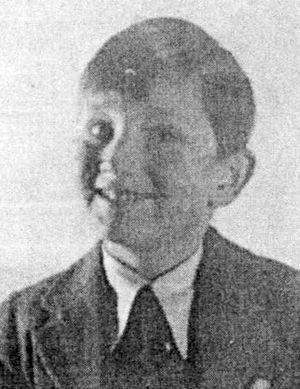
"In Newport a great bonfire was built in the Square made of wicker shell cases with the effigy of Hitler on top.
"However, the event would have taken time to organise so it wouldn't have been on May 8.
"Bromley's electricians on my father's instructions illuminated the church tower, flags were shown everywhere, fireworks let off, and bands played.
"The pubs did a roaring trade, particularly the old Vine Vaults, which was the prime pub during the war years. Speeches were no doubt made from the balcony, as was the custom, and as the evening wore on the town band took their seats there and began to play rousing music.
"To the amusement of the crowd my father appeared in the double doors to the balcony conducting the band. He was no musician so the whisky must have flowed well that way.
"It was not until the Vine was being demolished 20 years later that I was able to stand on that balcony myself, only to find that it was only 18 inches wide. Each bandsman must have carried his chair, plus instrument, and been trapped in position until the end of the evening.
"Later I was also strongly criticised about the wicker shell cases used to make the bonfire which I was told did not exist. Well, they did, because I saw them there!
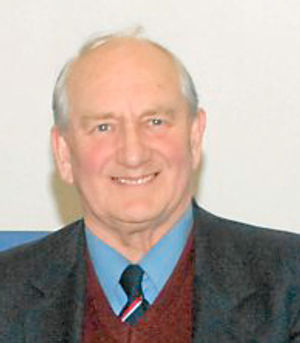
"In fact, as I learnt much later, the bonfire had to be hurriedly built while the excitement was on and the materials had been supplied by Donnington depot. The wicker shell cases, probably unknown in the European theatre, had been produced for the Middle East campaign during the First World War where they had been slung in pairs over the backs of mules and horses to carry shells to the front line.
"Doubtless the depot had seen a good and appropriate way to get rid of old stock.
"Later my mother, Edith, received a letter of thanks from the Queen for taking in an evacuee in 1939.
"As it was 75 years ago and I was only seven years old at the time, it is a bit difficult to remember what I did at the celebrations, but presumably I was there with my mother. In those days to 1965 we lived at Beechmount, Station Road, Newport, not many yards from where I live now.
"My father's name was Roye Adams – my grandmother thought the name looked unfinished without the 'e'. She married twice so he was a half brother to the Bromley family. At the time he was the managing director of John Bromley & Company's Newport branch in St Mary Street.
"John Bromley & Co, (Wellington) Ltd 1883-1969 were the largest firm of agricultural, electrical & water engineers in Shropshire and Mid Wales by the end of World War Two."
David Adams, of Newport
'I have come to tell you the war is over and you can all go home now and take a Mars bar with you!'
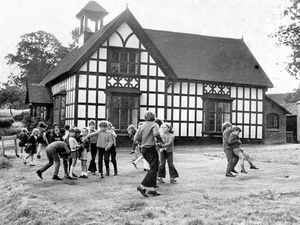
"I was a pupil at Weston-under-Redcastle in 1945.
"There were only 18 children and only one teacher, who was Mrs Clarke. How did she manage to teach us all, from the rising fives up to the 11-year-olds?
"There was one long classroom in this lovely black and white little school where the playground consisted of a huge oak tree with many twisted and curling roots. Wonderful for playing! Friday afternoons were always taken up with country dancing when Mrs Clarke played the piano and called out the instructions at the same time. We did nature study and went for nature walks.
"What a happy school it was. Across the road where there is now a golf course was a camp for German prisoners of war who were guarded by American soldiers.
"We were all sitting in our rows when someone opened the school door and in came an American soldier with a cardboard box under his arm. What a surprise to have a visitor and especially one in uniform!
"'Hello children,' he said. 'I have come to tell you the war is over and you can all go home now and take a Mars bar with you!'
Joyful
"I had not seen a Mars bar before and could not wait to run home to share it with my baby brother and big sister. What a joyful day. Even though I had never realised how dreadful the war was, I hated the air raid practice when we had to squeeze into the cupboard under the stairs. Or when dad went off to the Home Guard and mum cried when he came home with a rifle.
"Otherwise it was fun to have an afternoon at school out in the fields looking for pretend hideaways.
"My name at the time was Joan Furber and my father was the cow man at the Citadel Farm, so we lived in The Citadel cottages and Lady Stanier lived in the big house.
"She was so kind and treated my sister Barbara and myself very well and often came to see us in an evening to check on our homework. Little did she realise we didn't have a light on because of the cost of the electricity, so we made do with an oil lamp. Lady Stanier would say it was bad for our eyes and switch on the electric light.
"My way to Weston school was through the Citadel gardens and I can still remember the scent of the azaleas, and the click of the big iron gate as I pushed it behind me.
"In the little wood that I passed were wild rabbits and often I would see a black rabbit chasing along with the common brown ones. Honestly I could go on for ever with such lovely memories of my young days."
Joan Chidlow, now living at Ellerdine
'Something was happening in the town square'
One Telford pensioner, who preferred not to be named, recalled the celebrations in Stow-on-the-Wold, where she was brought up.
“I was 12, so quite big. We must have noticed that something was happening in the town square. It was obviously very quickly put together. The firemen used their hoses to squirt foam up in the air which fell down and made a sort of snow on the ground," she said.
“We had races. It was a handicap, 100 yards, but I only had to do about 50 yards – the others were handicapped because I was a poor runner so they made the distance shorter for me. They came and said to me 'you stand here' and put me towards the front.
"I won the race and got a £1 National Savings Certificate for coming first, but some of the mums weren’t too pleased about that because they thought it was unfair. I put the money in the post office. There was not a lot to buy at the time."
'Haven't you heard it on the wireless? It's a day off today.'
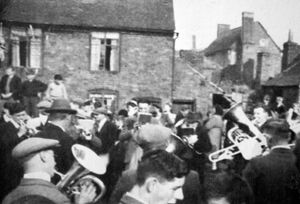
Today, May 8, 2020, on his 91st birthday, Ron Miles of Jackfield is planning to re-enact exactly what he did on VE Day 75 years ago, when he turned up for work as usual first thing in the morning only to find the door of the factory mysteriously locked.
"I had no idea it was VE Day because I failed to listen to the wireless the night before," said Ron, whose place of work was Chillcott's in Coalport.
"Two other lads were there too, and they had failed to listen as well. We turned up at 7.30am which was opening time.
"Chillcott & Co Ltd made silencers for tanks, lorries and Bren Gun carriers, and also jerry cans, and heaven knows what. We stood there for some time and then a very kind lady, Mrs Woodhall, who lived in Coalport High Street by the china works, came down and asked what we were doing there. We told her we had come to work.
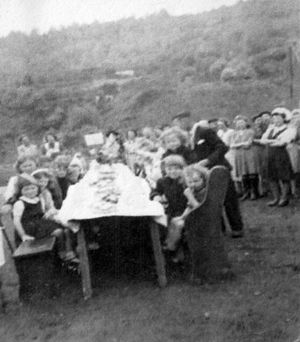
"She said: 'Haven't you heard it on the wireless? It's a day off today. Everybody is on holiday. Why dunna you go back whum?' So we turned round and went back home."
Although we say Ron has been planning to perform his re-enactment on the exact 75th anniversary, the present coronavirus restrictions obviously mean there is a question mark over that, so Ron did take the precaution of also re-enacting it for a photographer somewhat early, in March – and thank you to Kelvin Lake for the picture.
Ron lived back in wartime days at 57 Lloyds Head – he lives today at Coalford, which is in Jackfield and is not to be confused with Coalport – and by midday the locals were beginning to organise a street party for the children in the Bull Ring, Jackfield.
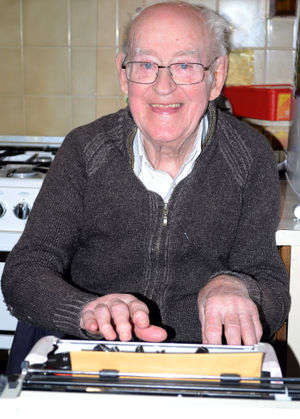
"I brought the chairs and tables out, we put them in the Bull Ring, and had a tea party. I was too old to take part and had to help look after the younger children. My mum and dad supplied the food and carried food from other people. We had trifles. Jackfield Band played and there was singing, probably Vera Lynn songs, I expect."
Ron worked in the tool shop at Chillcott's, on a lathe.
"Chillcott's was in the end of the Coalport China Works, which was split into three wartime factories. The middle part was Marriss & Co, which made all manner of war weaponry, and the lower third of the works was Klinger & Co, from Sidcup, Kent, which made gaskets for Merlin engines."
Ron had begun to work at Chillcott's at the age of 14, but at the age of 16 and a half left to join the Army, with an unusual motivation.
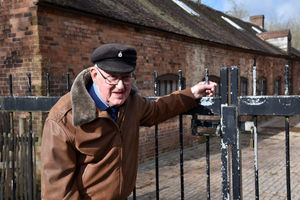
"I wanted desperately to wear a kilt," he said.
"I had collected cigarette cards, with soldiers of every regiment, but when I saw the Cameron Highlanders, Seaforth Highlanders, and Black Watch, I wanted to wear a kilt."
However at the recruiting office in Shrewsbury it was pointed out to him that those regiments recruited in Scotland.
Young Ron was not put off his desire to join the Army, and the recruiting officer suggested the Scots Guards, but that did not appeal, and he joined the Coldstream Guards (which do not wear a kilt).
'There was a big hole in the roof and the windows were blown out. If my brother had been in bed it would have fallen on him and might have killed him'
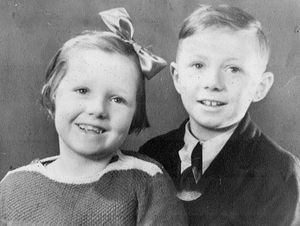
For young Brenda Moody, the war had dramatically and explosively come to her doorstep in Shrewsbury just a few days before her fifth birthday.
So as she and her family celebrated the end of the European war, they were among those who had suffered loss – in their case the temporary loss of their home in the county town due to bomb damage.
Brenda, who is now Mrs Brenda Thorpe and living in Bomere Heath, was injured in that attack during the Blitz, albeit indirectly from a hot kettle and, happily, not seriously.
She recalls of the VE Day celebrations: "There was this chap who lived in Derfald Street who was a marvellous pianist and they got the piano from his house to where the air raid shelter had been, between Crewe Street and Derfald Street. We had a party and he was playing the music for it. We were all having games and rejoicing."
But in the dark days of 1940 the Moodys had no cause for rejoicing, apart from the relief of escaping with their lives after their home at 22 Crewe Street, one of a row of terraced houses, was damaged by a bomb.
"The bomb fell on the railway line not far from us. My dad, Peter, worked on the railway as a guard. The night it happened – October 9, 1940 – my brother Bill and I were playing on the hearth and my mum, Gert, was upstairs getting ready for us to go to bed.
"She had the kettle on the old black-leaded fireplace ready to fill hot water bottles. My brother saw the plane passing and saw the swastika on it. It must have been a terrific bang – I'm nearly 85 and it's a job to think back all those years.
"I honestly can't say what I did but when mum came down we had to go down to the air raid shelter at the bottom of the street. They cordoned off the road. Mum wanted to go back and get dad's dinner out of the oven, but they wouldn't let her."
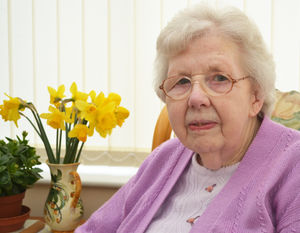
The house was damaged by blast and falling debris.
"There was a big hole in the roof and the windows were blown out.
"If my brother had been in bed it would have fallen on him and might have killed him. We were out of the house for weeks while they repaired it.
"Some friends who lived nearby, Mr and Mrs Sid Jones, came and offered us a home until our house was repaired. When they undressed me to go to bed my back was all blisters from the kettle falling on my back. I had not felt that at the time.
"I think I'm the only one alive now who lived in Crewe Street when we were bombed. The row was knocked down and the fire station is built there now.
"We were only in a two bedroomed house. I had to share a bedroom with mum and dad, and my brother had the other room. We had an outside toilet, which four or five houses had to share. We had an outside tap, no electricity. We used candles and there was a gas light in the living room.
"When it was time for my dad to get up for his shift at 3am they used to come to tap on the window to wake him.
"We moved into a three-bedroomed council house a few years later."
'We were lucky to survive'
"I was seven years old when war started.
"I came from a large family and my father went to join the army and left us to look after ourselves.
"We lived in the Black Country at the time and most nights the bombs were coming down and we all had to run into a small air raid shelter until the all clear sounded. We were lucky to survive at the end of the war.
"To mark VE Day we lit a fire in the middle of the road, a quiet street called Borough Crescent, near Oldbury, and many people were dancing round the fire until the early hours of the morning.
"Four years after the end of the war I was called up myself to join the Royal Artillery and was sent to the Rock of Gibraltar to serve my time. I served two years there. Some of the troops went to other parts of the world. I never saw some of my mates again."
Cyril Robinson, of Horsehay

